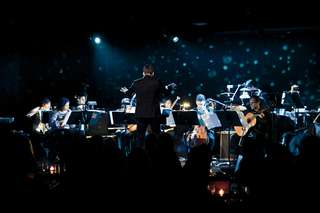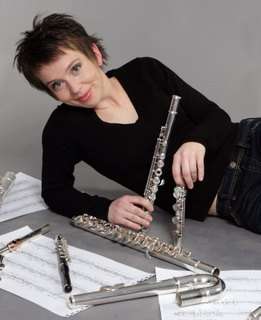|
Back
Transcendental Etudes New York
Starr Theatre, Alice Tully Hall
07/19/2010 -
Edgard Varèse: Poème électonique (1958) – Un Grand Sommeil Noir (1906) – Hyperprism (1923) – Offrandes (1921) – Intégrales (1925) – Ecuatorial (1934) – Dance for Burgess (1949) (ed. Chou Wen-Chung, 1998) – Etude pour Espace (1947; orchestrated and arranged for spatialized live performance by Chou Wen-Chung, 2009) – Density 21.5 (1936) – Déserts (1954)
Claire Chase (Flute), Anu Komsi (Soprano), Mika Rännäli (Piano), Alan Held (Bass-Baritone), Jonathan Golove, Natasha Farny (Cello Theremins), Sö Percussion: Eric Beach, Josh Quillen, Adam Sliwinski, Jason Treuting
Musica Sacra Chorus, Kent Tritle (Chorus Master/Organist), International Contemporary Ensemble (ICE), Steven Schick (Conductor)

The International Contemporary Ensemble (© Chad Batka)
An eminent writer described last night’s incredible concert–the first of two concerts devoted to the music of Edgard Varèse–as the equivalent of “being in a church.” I cannot agree. The only comparable religious experience would be the scene in the Bhagavad Gita where Lord Krishna reveals himself to the shepherd Arjuna as the whole universe, as the god behind the universe and as time forward and backward , the personification of eternity.
Which is also a misreading. Edgard Varèse never wrote took on mystical dimensions. He was the composer who bravely followed no rules, founded no school (okay, Frank Zappa liked him), but whose blocks of sound reached new intensity. The French-Italian composer spent most of his life in the United States, but American musicians, with the exception of Leopold Stokowski, wanted nothing to do with Varèse or Ives or Ruggles or any individualist. So while he was never totally ignored, Varèse was writing in silence, breaking all the boundaries, giving his music the blocks of sound which the Cubists were giving in blocks of paint.
Even when he was performed in his lifetime, Varèse never had the sounds which were in his own mind. That, though, was rectified last night, and hopefully in the second part tonight.
One reason is that the International Contemporary Ensemble (ICE) consists of the finest first-chair players which is possible to get today. One cannot single out a single player, because, under Steven Schick they can play the most difficult music with accuracy unheard of in Varèse’s time.
The second reason is that Alice Tully Hall has the auditory equipment which would have given Varèse true joy. Like Beethoven, he heard the music in his mind, but never adequately in reality.
This concert started with one of his final works, written for a pavilion designed by Le Corbusier. Poème électonique was played in total darkness. We were listening, though, like anthropologists seeing a pristine primitive village. His drum sounds were obviously on a pulse-generator circa 1958. The bells, sirens, and persistent rhythmic grab the imagination. His projected “four loudspeakers” were far more, surrounding the sold-out audience here, with only the female voice–itself augmented– and given a new life. Electronics has gone far ahead in the past half-century, but Varèse knew how to write it in the raw.
With great imagination, the concert went to his first work, a almost analogous to Debussy in 1908, with Debussy’s favorite poet, Verlaine. Yet something was different. The harmonies were Impressionistic, the song, lyrically understated by Anu Komsi, had an exotic touch which touched on Ravel’s paeans to the Middle East. It was the individual Varèse still looking for his own voice.
That came with the following works, with the mammoth fevers of Hyperprism and an amazing rendition of Offrandes by Ms. Komsi.
I was waiting patiently for one of my favorites, Ecuatorial, sung by the basses of the choir. This is the work which Villa-Lobos, with greater genius, would probably have loved to write. Varèse, though, did write the mystical AmerIndian verses. Here, though, one didn’t think of music so much as a combination of Levi-Strauss and Jung. The anthropologist and the psychia-philosopher digging deeply into our psyches. Long before the composer or his avatars knew of DNA, Varèse had plunged himself into this cavern of ancient history.
I had heard it with choir, but Varèse had written it for bass-baritone, and here Alan Held roared forth the wonders of the music.
Analogous to this was the Etude pour Espace, never finished by Varèse, but here re-orchestrated with choir and soprano, by Chou Wen-chung, who was in the audience.
This was the first time I had heard the music, and again I had to revel. Not so much in Varèse’s orchestration as the Musica Sacra choir. Whether he meant to or not, much of the vocal music reflected 14th Century Burgundian church music: the major-fifth harmonies, and the unison lines with trombones resonating like choirs in Notre-Dame or Chartres. I could not believe how Varèse (or Mr. Chou) could bring together the most advanced composer of the 20th Century seamlessly with that of the earliest Church music.

C. Chase (© Janette Beckman)
I had noticed in all the ICE music, one woman whose shoes were as dazzling as the music. They were jeweled, the jewels threw off iridescent colors throughout Alice Tully Hall.
And no, this is not a fashion statement. For that glitter was reflected by Claire Chase’s flute performance of Varèse’s only solo music, Density 21.5. That is the chemical number for platinum, and one was not sure that Ms. Chase was playing a platinum flute. Whatever the metal, Ms. Chase danced, twittered, hit the sounds, double-toned, and made her flute glitter through the audience–both visually and auditorially–along with that Wizard of Oz footwear.
The final work was one of Varèse’s own final pieces, Déserts, he once said, “is a magical word, suggesting correspondences and infinity.” That is appropriate for all his music, but here he had composed an electronic score to go with the orchestra, probably the first composition like that.
Boulez’s recording eliminates the electronic part, feeling it is too “primitive”, that the music can stand by itself. Here, it was played with very advanced electronics. Varèse did it mainly with a musique concrète from organ sounds, but these sounded nothing like it. All that the audience–a stunned, hypnotically attentive bedazzled audience–heard were these sounds of ICE giving forth sounds which plunged even neophytes into the darkness and lights of our own minds.
For ICE and their soloists last night, projected what Pythagoras called the music of the spheres, and what Varèse called the secrets of our stars and our sounds.
The International Contemporary Ensemble
Harry Rolnick
|